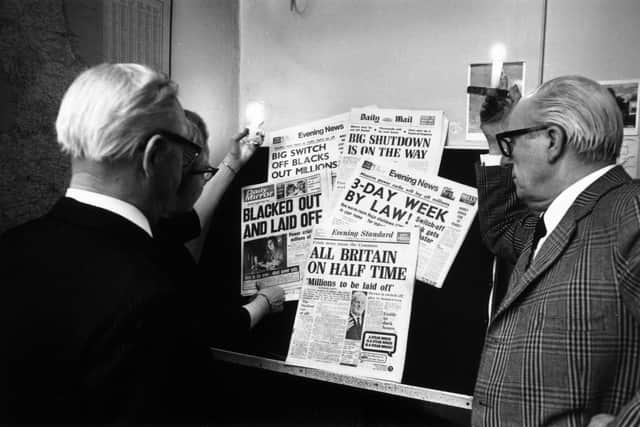When was the last planned blackout in the UK? What caused blackouts, how long did it last, impact explained
and live on Freeview channel 276
The UK could be facing a tough winter ahead after the National Grid warned that planned blackouts could take place in the country if gas supplies dwindle.
The group said that it was “unlikely” to turn to this situation, however told consumers that if gas was to be cut off from Russia and the UK faced extreme weather, there may not be enough gas to operate some power plants. If this is the case, then controlled blackouts may be introduced to help conserve as much electricity as possible during the winter period.
Advertisement
Hide AdAdvertisement
Hide AdThis would not be a new measure, as the UK has experienced controlled and planned blackouts in the past. But when was this, and why were they introduced?


When was the last planned blackout in the UK?
The last planned blackout occurred in the 1970s. This was under measures known as the ‘three day week’.
Beginning on 31 December 1973 and lasted just over two months. The three-day week was lifted on 7 March 1974.
The premise of the three-day week was to limit the consumption of energy supplies for commercial users. Businesses were limited to only using three days worth of energy per week and they were not permitted to work longer hours on these days.
Advertisement
Hide AdAdvertisement
Hide AdPrior to this, scheduled blackouts were already in place from February 1972. The Central Electricity Generating Board told consumers that some households would see power cuts lasting nine-hours amid a six-week miners’ strike.
Energy restrictions were extended to private households. Residents were ordered to only heat one room at a time, while also being ordered to turn off any non-essential lights.
There have also been unplanned widespread blackouts more recently in 1987. This was as a result of strong storms battering parts of the UK, leaving around 1.1million people without power.
What caused the blackouts in the 1970s?
One of the main reasons for the controlled blackouts beginning in 1973 was the oil crisis in the Middle East. A war broke out between Israel and a coalition of countries including Egypt and Syria in October 1973, and the supply and price of oil from the Middle East was left uncertain.
Advertisement
Hide AdAdvertisement
Hide AdAdditionally, a second strike held by miners in 1974 added pressure to this energy situation. In the 70s, most of the UK’s electricity was coal-powered - with miners on strike, there was a finite amount of energy to be used by the country.
In order to mitigate the effects of this dwindling energy supply, the Conservative Prime Minister at the time Edward Health introduced the three-day week on New Years’ Eve 1973.
What were the impacts of the three-day week?
As the three-day week limited the amount of time a private business could effectively run, the planned blackouts had a huge effect on people’s lives. Those working in businesses where electricity was essential were only able to work three days per week, meaning that overtime and extra shifts were not a possibility.
The restrictions were not extended to businesses or services deemed as essential. This included hospitals, supermarkets and newspaper printers. The rolling blackouts also saw businesses such as pubs operating by candlelight if they were able to open.
Advertisement
Hide AdAdvertisement
Hide AdWith restrictions to television channels, the BBC and ITV were told to switch off programming at 10.30pm in order to conserve energy. Later into the restrictions, the channels would alternate their shutdown times in order to avoid a power surge on the network.
Comment Guidelines
National World encourages reader discussion on our stories. User feedback, insights and back-and-forth exchanges add a rich layer of context to reporting. Please review our Community Guidelines before commenting.
